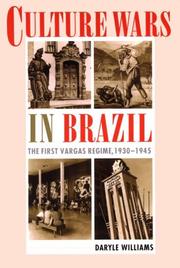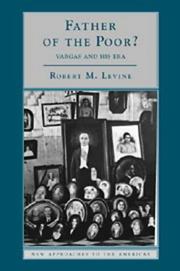| Listing 1 - 3 of 3 |
Sort by
|
Book
ISBN: 029273655X 0292740786 0292771754 Year: 1967 Publisher: Austin ; London : University of Texas Press,
Abstract | Keywords | Export | Availability | Bookmark
 Loading...
Loading...Choose an application
- Reference Manager
- EndNote
- RefWorks (Direct export to RefWorks)
The dominant public figure in Brazil from 1930 until 1954 was a highly contradictory and controversial personality. Getúlio Vargas, from the pampas of the southern frontier state of Rio Grande do Sul, became the dictator who ruled without ever forgetting the lower classes. Vargas was a consummate artist at politics. He climbed the political ladder through seats in the state and national legislatures to the post of federal Finance Minister and to the governorship of Rio Grande do Sul. His career then took him to the National Palace as Provisional President and as Constitutional President, and later as the dictator of his "New State." After his deposition in 1945 and a period of semiretirement, his continuing widespread popularity resulted in his successful come-back campaign in 1950 for the Presidency on the Labor Party ticket. Vargas' contributions to Brazilian political and economic life were many and important. Taking advantage of the power which his political magic provided him, he brought Brazil from a loose confederacy of semifeudal states to a strongly centralized nation. He was a great eclectic, welding into his social, political, and economic policies what he found good in various programs. He was also a great opportunist in the sense that he adroitly took advantage of conditions and circumstances to effect his ends. He was intimately related to the revolutionary changes in Brazilian life after 1930. Vargas, "Father of the Brazilians," attributed achievements such as these to power in his own hands. His foes, however, still feared the political wizard, and they cheered the military when it deposed him. After his return, "on the arms of the people," Vargas saw that the armed forces were determined to repeat history, and in 1954 he chose another path—suicide. All of these exciting events are related in John W. F. Dulles's Vargas of Brazil: A Political Biography. Despite its emphasis on Vargas the politician and statesman, the reader comes to know Vargas the man. For this portrait of Vargas and of Brazil the author has drawn much material from State Department papers in the National Archives and from other public sources, and from interviews with numerous persons who were participants in the events he describes or observers of them. The result is an interesting, revealing, valid account of an important people. Many illustrations supplement the text.
Vargas, Getúlio, --- Brazil --- Politics and government --- Dornelles Vargas, Getúlio, --- Dorneles Vargas, Getúlio, --- BIOGRAPHY & AUTOBIOGRAPHY / General.

ISBN: 1282903829 9786612903823 082238096X 0822327082 0822327198 9780822327080 Year: 2001 Publisher: Durham (N. C.): Duke university press,
Abstract | Keywords | Export | Availability | Bookmark
 Loading...
Loading...Choose an application
- Reference Manager
- EndNote
- RefWorks (Direct export to RefWorks)
In "Culture Wars in Brazil", Daryle Williams analyses the contentious politicking over the administration, meaning, and look of Brazilian culture that marked the first regime of president-dictator, Getulio Vargas (1883-1954). Examining a series of interconnected battles waged among bureaucrats, artists, intellectuals, critics, and everyday citizens over the state's power to regulate and consecrate the field of cultural production, Williams argues that the high-stakes struggles over cultural management fought between the Revolution of 1930 and the fall of the Estado Novo dictatorship centred upon the bragging rights to brasilidade - an intangible yet highly coveted sense of Brazilianness. Williams draws upon a rich selection of textual, pictorial, and architectural sources in his exploration of the dynamic nature of educational film and radio, historical preservation, museum management, painting, public architecture, and national delegations organised for international expositions during an unsettled era when modern Brazil's cultural canon took definitive form. In his close reading of the tensions surrounding official policies of cultural management, Williams updates the research of the pioneer generation of North American Brazilianists, who examined the politics of state-building during the Vargas era, while engaging today's generation of Brazilianists, who locate the construction of national identity of modern Brazil in the Vargas era. By integrating Brazil into a growing body of literature on the cultural dimensions of nations and nationalism, "Culture Wars in Brazil" will be important reading for students and scholars of Latin American history, state formation, modernist art and architecture, and cultural studies
Politics and culture --- Culture --- Culture and politics --- History --- Political aspects --- Vargas, Getúlio, --- Dornelles Vargas, Getúlio, --- Dorneles Vargas, Getúlio, --- Brazil --- Politics and government --- Cultural policy. --- Vargas, Getúlio, - 1883-1954.

ISBN: 0521585155 0521585287 Year: 1998 Publisher: Cambridge ; New York, NY, USA : Cambridge University Press,
Abstract | Keywords | Export | Availability | Bookmark
 Loading...
Loading...Choose an application
- Reference Manager
- EndNote
- RefWorks (Direct export to RefWorks)
"Biographical essay on Getúlio Vargas, dictator and elected president 1930-45 and 1951-54, focuses on inconsistencies in his claim to be a social reformer. Includes a creative collection of documents and photographs showing Vargas' many images. Extremely useful for students"--Handbook of Latin American Studies, v. 58.
Vargas, Getúlio, --- Brazil --- Brésil --- Economic policy. --- Politics and government --- Social policy. --- Politique économique --- Politique sociale --- 800 Collectie Vlaams Vredesinstituut --- 830 Economie --- 841 Politiek Bestel --- 841.4 Politieke figuren --- 842 Media --- 844 Sociale Structuur --- 882.2 Zuid-Amerika --- Vargas, Getúlio, --- Brésil --- Politique économique --- Dornelles Vargas, Getúlio, --- Dorneles Vargas, Getúlio,
| Listing 1 - 3 of 3 |
Sort by
|

 Search
Search Feedback
Feedback About UniCat
About UniCat  Help
Help News
News